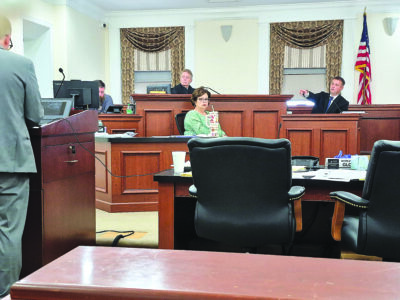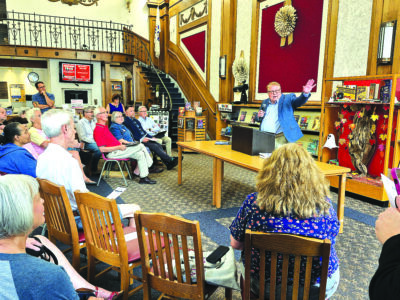Advocates react to Dewine’s request for disaster declaration
EAST PALESTINE, Ohio — Five months to the day after the Norfolk Southern train derailment led to the intentional release of over 1 million pounds of vinyl chloride over East Palestine and surrounding communities, Ohio Gov. Mike DeWine requested that President Joe Biden issue a Major Presidential Disaster Declaration.
Monday also was the deadline for the first extension DeWine requested from the Federal Emergency Management Agency to expire.
For Jessica Conard, a lifelong and multigenerational resident of East Palestine, the request is a step toward recovery. Ever since the burning train passed through her backyard moments before derailing, Conard has been vocal in her advocacy for those impacted and to all those who live near train tracks across the country.
“This is great news and certainly a win, not just for the community but for the country,” Conard said. “It sets a precedent and provides reassurance of federal support should this happen again elsewhere. If we don’t make changes for safer rail and hazmat movement, it will happen again.”
A declaration of disaster establishes that an event exceeds the response capabilities of local and state agencies and that federal relief is needed to save lives and protect property, public health and safety.
If Biden issues the declaration, $5 million in federal aid will be made available to communities and individuals in and around East Palestine.
The Unity Council for the East Palestine Train Derailment — a community advocate and oversight group formed by area residents in response to what they consider a poor response by officials to the derailment — has been steadfast in demanding such a declaration since the train jumped the tracks on Feb. 3.
“I’m happy that Governor Mike DeWine finally requested a Major Disaster Declaration. This should have happened five months ago, but I’m glad that now the door can be opened for affected residents to receive access to federal resources,” Hilary Flint, a resident of Enon Valley, Pennsylvania, and a founding member of the Unity Council, said. “While Norfolk Southern claims they are ‘making it right,’ families in Negley, Darlington Township, and Enon Valley, still don’t have the ability to get help at their assistance center. We hope that changes soon, and that people within a much larger radius will have access to testing.”
The Unity Council put a disaster declaration at the top of its list of demands it issued in May during what the group billed as a “community press conference” and, on June 14, the Unity Council traveled to the Statehouse in Columbus to pressure DeWine to make the request. The group also established an online petition to demand a disaster declaration from the governor. As of Monday, it had collected over 13,000 signatures.
The day before the Unity Council’s protest in Columbus, DeWine announced that he had requested a second extension from FEMA. Governors have just 30 days from the occurring event to make a request for emergency declaration. DeWine submitted his first extension request on March 5, asking for 120 more days.
Up until Monday, DeWine’s office had maintained that the derailment did not qualify for aid under FEMA’s guidelines due to lack of unreimbursed property damage caused, while the Unity Council argued that the derailment had caused property damage due to the chemicals leaked during the event itself and by the vent and burn of vinyl chloride that followed it. The Unity Council contends the chemical releases created widespread contamination and thus the loss of real property as well as property values.
The Unity Council also argued that while lives were not lost in the derailment, health was, and insisted the declaration was needed to open up resources to those who are suffering symptoms now and those who will suffer in the future.
In his letter to Biden, DeWine acknowledged health concerns, stating that the derailment “had immediate physical and mental health effects on the community” and that “long-term health effects are unknown.” He also pointed out the economic impacts of the rail disaster, writing that “homeowners and businesses have seen a decline in property value and loss of business as people are hesitant to come into the community.” DeWine said that so far Norfolk Southern has “provided much needed assistance to the community” but recognized that could change, writing that the assistance “is not guaranteed moving forward and could terminate for a variety of reasons.”
The declaration would also help open the door for area residents to demand the implementation of Social Security Act 1881a to the derailment. The policy provides free health care to citizens whose health is impacted by environmental disasters. The government applied the act in Libby, Montana, where 10 percent of residents have been diagnosed with an illness related to naturally occurring asbestos that was unearthed under the town of 4,000 during mining operations. A March for Medicare for All is planned at the Columbiana County Courthouse from noon to 3 p.m. July 22 to advocate for the act’s invocation in East Palestine.
“We have all been exposed to environmental health hazards that will likely have long-term health consequences,” Conard said. “Emergency declaration can provide peace of mind for those issues to be addressed first. It also provides the opportunity to potentially take advantage of Social Security 1811A for long-term health needs due to ongoing environmental hazardous exposure.”
Conard also hopes the declaration will lead to widespread testing that will track both the epidemiological and environmental impacts of the derailment.
“There are current unmet needs that are being ignored,” she said. “We have continually requested health-monitoring opportunities and efficient indoor-home assessments. As a community, many of us have repeatedly been denied a chemical-exposure health assessment by local practitioners and many labs will now refuse to complete these services.”






